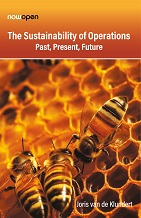The Sustainability of Operations: Past, Present, Future

By Joris van de Klundert, Escuela de Negocios, Universidad Adolfo Ibáñez, Chile, joris.vandeklundert@uai.cl
Publication Date: 29 Jan 2024
Suggested Citation: Joris van de Klundert (2024), "The Sustainability of Operations: Past, Present, Future", Boston-Delft: now publishers, http://dx.doi.org/10.1561/9781638282853
Downloaded: 38964 times
Description
Human operations, whether in business, at home, or otherwise, cause a transgression of the boundaries of a safe and just operating space for planet Earth and humankind. Developments in operations that have steadily grown over the long course of history, and which have especially gained momentum since the uptake of fossil fuel powered machines in the recent and on-going industrial revolutions, now threaten to cause irreversible damage to ecosystems and society. The present situation calls for new perspectives and understanding of operations and operations management that enable to change the course of development and for operations to provide sustainable solutions for the planet and humankind.
In pursuit of sustainable operations, this book analyses the past, present, and future of operations. It first examines the history of operations while explicitly reflecting on its environmental and social sustainability and on the corresponding development of operations management practices. Chapters 2 and 3 provide corresponding theoretical foundations and start studying the operations on planet Earth prior to the appearance of humankind. Chapters 4 to 9 cover the history of human operations until now, from stone tool manufacturing to lights out manufacturing, and from clay tokens to service robots. Chapter 10 synthesizes extant unsustainable operations and operations management practices and the present 4th industrial revolution. Chapter 11 identifies the transition in operations and operations management needed towards a future safe and just operating space, and how the 4th industrial revolution can contribute to this transition.
The book is firstly written for all practitioners, scientists, and students of operations management and operations research. It offers extensive and historical insight into the relationship between operations and sustainability that has not yet appeared in the operations management literature. The final two chapters help the operations community to understand current problems, to find directions towards sustainable operations, and to contribute to the necessary transition. The book may also serve as a valuable resource for policy makers, business strategists, technology managers, and others devoting themselves to creating a sustainable future, as it may build the necessary understanding of the present operations that cause transgressions of the safe and just operating space, and of the transition towards sustainable operations.
-
ISBN: 978-1-63828-285-3
282 pp. Open Access (.pdf) This is published under the terms of CC BY-NC
